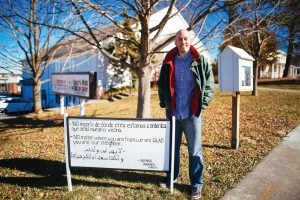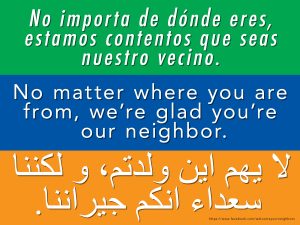
 Tri-color signs are appearing in yards across Harrisonburg. In the center, in English, the signs say, “No matter where you are from, we’re glad you’re our neighbor.” The sentence is repeated above in Spanish and below in Arabic.
Tri-color signs are appearing in yards across Harrisonburg. In the center, in English, the signs say, “No matter where you are from, we’re glad you’re our neighbor.” The sentence is repeated above in Spanish and below in Arabic.
The signs come from the Harrisonburg District of Mennonite Churches. There are currently about 400 signs around the city, with more being printed.
Matthew Bucher MA (conflict transformation) ’15, SEM ’15 is pastor of Immanuel Mennonite Church in Harrisonburg. He came up with the idea last fall during the heated presidential primary debates.
“I was disappointed and angry by some of the rhetoric that I was hearing from some of the candidates,” Bucher said, adding that he doesn’t remember which specific candidate during the Republican debate first sparked his anger, but Republican presidential nominee Donald Trump, namely, had been vocal about his desire to ban Muslims and build a wall along the U.S.-Mexican border. The controversy over the Syrian refugee crisis has also stirred anti-immigrant sentiments.
“If there are things that endanger my neighbors, whether they’re from Honduras or Egypt, I want to treat them as a neighbor,” Bucher said. “I want to love them, even if they got here a little more recently than I did. We’re still neighbors. We’re still called to care for one another.”
Bucher said his congregation, including original sign painter Melissa Howard, supported the idea from the start. The Harrisonburg District of Mennonite Churches then decided six months ago to make the signs available more broadly. The church posted information about the signs on Facebook, and word is spreading, with signs going to Indiana, Nebraska, Pennsylvania, Mississippi and California.
Paul Groff ’90 , a member of Ridgeway Mennonite Church in Harrisonburg, has the welcome sign in his front yard in the south side of the city. He counted nine signs on a recent two-mile run through his neighborhood.
“We want to show that we’re welcoming of all folks, no matter where they’re from,” Groff said. “We feel our various cultures enrich us and connect us to the wider world.”
Bucher said it’s “absolutely crucial” that fellow Christians show hospitality no matter where someone is from, and to love thy friends, neighbors and even enemies. The signs, he said, express a deeper commitment from the church.
“These signs are a marker of something that’s deeper for us,” Bucher said. “It’s not ‘put the sign out and pat ourselves on the back.’ We put this sign out to say, ‘This is how we want to live. We want to love each other as God loves us no matter if we’re from a different country or we speak a different language.’”
The signs cost $10, with a portion of sales donated to the Mennonite Central Committee, which is the relief and development organization for the Mennonite Church.
